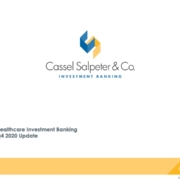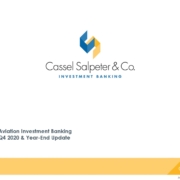As part of my series about “How To Take Your Company From Good To Great”, I had the pleasure of interviewing James S. Cassel, cofounder and chairman of Cassel Salpeter & Co., LLC, an investment banking firm with headquarters in Miami, Florida, that works with middle market companies.
Using his unique experience as a dealmaker and attorney to guide clients and help them achieve their goals, Jim has successfully negotiated, structured, and executed a broad spectrum of transactions including mergers, acquisitions, and divestitures, corporate and transactional financings, and public offerings for clients nationwide and worldwide. Having developed a keen understanding of the issues faced and alternatives available for distressed companies, he has particular experience in developing financial restructuring plans, negotiating with creditors, and guiding debtors through bankruptcy proceedings. Nationally recognized for his investment banking expertise, Jim frequently lectures on timely issues related to middle market investment banking and writes a column for the Miami Herald about emerging trends, strategies and tactics for middle market business owners. Before founding Cassel Salpeter & Co., Jim was cofounder and chairman of Capitalink, an investment banking firm that was acquired by Ladenburg Thalmann & Co., a New York Stock Exchange member firm where Jim continued and served as vice chairman, senior managing director, and head of investment banking.
Thank you so much for joining us in this interview series! Before we dive in, our readers would love to “get to know you” a bit better. Can you tell us a bit about your ‘backstory’ and how you got started?
I was a securities lawyer for 17 years but really didn’t have anything close to a work/life balance. Like most securities attorneys I thought we did all of the work while the investment bankers were making all the money. I had a client who encouraged me to become an investment banker and join his firm because I was good at making deals, so I finally did it. Although I have better work/life balance, today, I still continue to be deeply absorbed by my work. I’m not complaining. I love the career I’ve chosen, but I’ve had to work very hard to carve out the success I and my firm enjoy today.
Can you tell us a story about the hard times that you faced when you first started your journey? Did you ever consider giving up? Where did you get the drive to continue even though things were so hard?
I grew up comfortably, but there were times in my professional career in both law and the financial industry when things looked bad. As a budding securities attorney, I found myself working very hard for a six month stretch without getting paid. I was getting seriously worried, when a friend who knew of my situation called informing me that I had won 5000 dollars in a raffle. I thought it was a joke, but he showed up at my home 10:30 at night with the check. I used that to pay my next mortgage payment.
I then joined a new law firm. After 17 years of law practice, I walked away from that career as a corporate/securities attorney, and as managing partner of the firm’s largest office during my best year and entered investment banking. Little over a year later, things went south with a business partner, and I had to face a decision: Do I turn back and practice law, or do I start an investment bank? To a certain extent, in both cases it would be a restart.
I think it’s important to note that I expected to succeed either way. This is not about being arrogant, but about believing you will succeed and having that confidence. It’s fundamental to succeeding, and a key to taking a business from good to great. You really do have to believe. I thought, I’m going to be successful at whatever I decide, but by creating an investment bank at the end of my career, I’ll also have a quality business to sell. So, I found new partners and started the investment bank Cassel Salpeter & Co.
About six months after kicking off my first investment banking firm, I did consider giving up when things were not going well. But by then realized there was a niche opportunity in the market issuing “fairness opinions.” Here, after substantial analyses we might determine that a transaction is fair from a financial point of view — and that saved our firm. That was 25 years ago, and we were rescued by a lawyer who sent us one deal that turned out to be the difference between making it or not making it. I never forget what he did for me.
There is also a lesson here in going from good to great in how this all played out, because before you can even get to good, never mind great, you have to survive. That lawyer decided to trust our services even though we didn’t have the track record that other firms had. Some might say we weren’t entitled to the opportunity, but we seized it and performed at a very high level and went on to prosper. We still do business 25 years later.
I started the first investment banking business from scratch when I was writing checks without receiving them. In both of my early starts the money was going out the door and not coming in as fast. When things got difficult what most kept me going was that I could not afford to fail. I had a wife and four children, and lots of bills and knew I could and had to make it work. There was no alternative.
Can you share a story about the funniest mistake you made when you were first starting? Can you tell us what lessons or ‘takeaways’ you learned from that?
I wouldn’t say this was a mistake, but when I quit practicing law and started in the investment banking business, I found myself with my new partner rising on a lift preparing to ski with clients. When we got to the top of the mountain, my new partner turned to me and said, “It’s all downhill from here.” I guess technically he was right.
What I’m trying to say is that depending on the sort of investment banking work we are doing, there can be significant impacts on the people behind the deals. Quite often we are selling what amounts to a person’s baby, and quite often it’s a baby in deep trouble. This can be traumatic for many business owners for whom their company can be an extension of their personality. Having a sense of humor and real compassion and feel for the players in a deal goes a long way.
What do you think makes your company stand out? Can you share a story?
I think, maybe more than other companies, we are very much committed to being a relationship business and doing what is best for our client and maybe, at times, to our own detriment. It is our culture. What I mean by that is that while we are always looking for a business opportunity, I think that we really are there to help irrespective of whether or not the person is ultimately going to become a client. To a certain extent this is in line with our work culture of giving back. And as a result, there have been more than a few occasions when we were going after business and lost it when the potential client switched directions, but we were still called back later to do work for them.
There may not be an immediate monetary benefit to committing to building a relationship, but you never know when those efforts may come back to benefit you and others if you take a long-term perspective. Very often, for example, we will see a client who really wants to sell a business and our analysis tells us this just isn’t the optimal time for a sale. I could take a fee to create a deal, but ultimately, I don’t believe that serves the client, so we encourage them not to move forward at this time. That’s about being relationship-minded, putting people above a single deal, and I think it’s something that separates us from the pack.
Which tips would you recommend to your colleagues in your industry to help them to thrive and not “burn out”?
The investment banking business is not an easy one. There’s a lot of research, analytical work, and background reading you have to put in to serve your clients at the level they expect. And then you have to really commit to developing and managing your relationships. This takes time. There are no shortcuts.
You have to pace yourself as you take this on. You have to constantly keep a clear head about where a relationship or deal is going and be prepared to pivot at all times. If you are really having a challenge with a client, for example, you have to face the fact that you either have to work it out or disengage from the client. If you keep a toxic working relationship going too long, you are setting yourself up to fail as well as to burn out.
When it comes to thriving, it starts with accepting that investment banking work means fundamentally understanding that this is a relationship/knowledge/idea business. If you can think creatively, you’ll find that developing those relationships isn’t a burden. Also, what clients are looking for are ideas, advice and knowledge. With many today working from home and not having face-to-face contact, maintaining relationships and developing new ones has never been harder. But by coming up with new ways of connecting and helping people and clients, you not only perform better, but sleep better. When you can see that there are people behind your deal strategy, I think it puts you on a pathway to a healthier lifestyle.
None of us are able to achieve success without some help along the way. Is there a particular person who you are grateful towards who helped get you to where you are? Can you share a story?
Besides my wife and family, I really owe a lot to my partner, Scott Salpeter. I was blessed to be introduced to him over 25 years ago by his father, who was a client of mine when I was practicing law. I went on to have Scott as a client, as well. When I left the practice to change careers and become an investment banker, I needed someone with his skills set and he agreed to join with me. We’ve been partners ever since, working together for almost 25 years through three investment banking businesses, the original Capitalink — which we sold to Ladenburg Thalmann & Co. and where I was vice chairman and head of investment banking — and our firm now, Cassel Salpeter & Co., that has been doing work I’m very proud of for over a decade.
Our personalities are very different. Between I and Scott we have a sort of yin yang balance. Our personalities and skills sets are very different, yet perfectly complimentary to our investment bank and therefore our clients. I believe, and I think that Scott would agree, that by teaming up we’ve been more successful working together than we would have been on our own. We’ve managed to be greater than the sum of our parts. One key is that we have implicit trust in each other, and that is priceless in this business.
Luck has also been a part of success for me. I was lucky when I married my wife. I got engaged to my wife after dating her six weeks and we’ve been together over 43 years and raised four kids together. So, I’ve managed to have great people to spend my time with during the day at work, as well as when I get home. When you talk about thriving without burning out, finding the right people to spend most of your time with is fundamental.
Ok thank you for all that. Now let’s shift to the main focus of this interview. The title of this series is “How to take your company from good to great”. Let’s start with defining our terms. How would you define a “good” company, what does that look like? How would you define a “great” company, what does that look like?
A good company usually has reached a high level in a range of criteria from having the right people in key positions, to being in a sound financial position, to having a good work culture, to having a leader with a clear and achievable mission. A good company will do well frequently in a lot of these areas, but a great company goes a step further and is firing on all pistons, without any areas of deficiency and therefore will have longevity.
As an investment banker working with companies across a range of industries, I’ve seen what look to be good, some might say great companies, but they don’t perform well because of the industry they are in. And I’ve seen good companies where that’s just a fine place to be, and the leaders are happy operating at that level. To take a company to the next level, for example, takes hard work and a commitment to be a great company. It starts at the top and must be the culture throughout the whole company. Not every company can be great, but they can strive to be better.
Based on your experience and success, what are the five most important things one should know in order to lead a company from Good to Great? Please share a story or an example for each. First read the book “Good to Great” by Jim Collins. He describes this much better than I could ever do.
• To take a company from good to great you have to have the right people in the right positions to begin with. We run a small company. As with any company, having the right people in each role is critical. You can take someone with an outgoing personality and put them in the back room drafting documents and end up setting them up for failure instead of putting them in a position where they can flourish.
• You have to have leadership that is openminded and collaborative, and at the same time, has a real vision and determination to achieve greatness and make the tough decisions. This starts with bringing in people to your team that may not necessarily have the same ideas or background as you and being open to doing things in new ways that you may not have previously experienced. If it’s getting you more efficiently to your ultimate goal, and you can incorporate your contributions as well, you have to be open to that.
• You have to be willing to innovate and part of this is being willing to take calculated risks and think outside the box.
• You have to be willing to make mistakes, acknowledge them, and change direction. I’ve hired wrongly, for example, and I’ve learned to correct that quickly. You do no favor to the employee, or the company by extending the relationship.
• And you have to be willing to help others and extend yourself to others in your industry, while taking a long-term view about business relationships.
Extensive research suggests that “purpose driven businesses” are more successful in many areas. Can you help articulate for our readers a few reasons why a business should consider becoming a purpose driven business, or consider having a social impact angle?
When I think of purpose driven businesses, I see this as an internal and external dynamic that ends up promoting the overall health of a company, as well as the environment it comes into contact with.
Look at a company like TOMS shoes which does good by not only selling a product, but by donating a substantial amount of that product to people in need. What they do helps the company internally in terms of morale because they feel good about their mission, but it also helps the company externally, because they are right to get their message out regarding their efforts to help others. That not only helps build brand loyalty, but it can lead to other companies following suit.
As the company itself says, “TOMS has always stood for a better tomorrow–one where humanity thrives. To us, that means no matter who you are or where you live, you feel physically safe, mentally healthy, and have equal access to opportunity. Every TOMS purchase enables us to invest in local partners around the world who are working to create positive change in these three areas.”
You can also look at a company like Apple, which now has great momentum with its watch. But that watch is not just telling time, it connects to one’s health care stats. They are developing a product that’s far beyond something designed just to make its creators money. They are developing a product that can actually do good.
As an investment banker engaged in health care industry M&A, I look at companies that are working on COVID-19 vaccines and therapies and it can be argued that they are purpose driven businesses. Sure, they are looking to earn a profit, but you can bet that they are also motivated to do great things for our society. The folks I work with in the health care industry are also mission and purpose driven.
At the end of the day, when you are a purpose driven business you are building momentum to make the world a better place and that’s definitely a part of going from good to great, because another aspect of a great company, is that everyone on board is motivated and feels their work has meaning and is part of something larger. Greatness isn’t just about a bottom line, but it’s how you feel inside about your company and your work. That builds camaraderie and helps create energy to achieve your mission and goals as a company. When you have satisfied employees, they end up more innovative, harder working, and they help your company grow, which is just better for everybody.
All that said, it’s important to note, that before you can be a truly purpose driven company, you have to have a quality product and a viable economic model. You can’t skimp on that.
What would you advise to a business leader who initially went through years of successive growth, but has now reached a standstill. From your experience do you have any general advice about how to boost growth and “restart their engines”?
From what I’ve seen many times in my work, companies come to a standstill when they fail to innovate or when they cut back on new product development. They really need to readjust their mindset. They need to reevaluate why they aren’t growing. Do they have the right products and services? Are they in a stagnant market in which case they need to find new markets and new products and services? Then they have to determine how to become innovative. Sometimes this requires a change of management at the top.
There has been many a company that was wonderful until it wasn’t. Much like people, sometimes it’s complacency and arrogance that keeps a company down. Consider Kodak or Polaroid. In the beginning, they were very innovative, and then they weren’t. Kodak went on to survive although as a shadow of its former self, but there was a point where they lost their edge, their drive, their innovation. Getting that drive back is sometimes about bringing in new people to get that fire started again. In some cases, it’s bringing back experienced, senior-level people, like when Steve Jobs rejoined Apple.
Business moves rapidly and there’s no place for those who take their current success for granted. If you are not moving forward, generally you’re moving backwards. Just look at Sears and what happened to them. They really should be the Amazon of today, but they didn’t innovate. They missed the boat. Sears Roebuck was the first catalogue company. What was Amazon? It was just an online catalogue for a bookseller at the beginning. But they obviously had a much bigger plan. They were looking to go from good to great.
Generating new business, increasing your profits, or at least maintaining your financial stability can be challenging during good times, even more so during turbulent times. Can you share some of the strategies you use to keep forging ahead and not lose growth traction during a difficult economy?
Focus and sales are the key. I believe that in a service business, which I’m in, it comes down to networking, staying in touch with your referral sources, not cutting back on revenue-generating things like marketing and PR, even though it might be difficult in the present environment to see their value right away.
When things are not going well you have to figure out where to cut back, and many make the mistake of cutting back on advertising, marketing and sales when it might be better to cut back on employees. PR and marketing are the front-facing part of a business, not something you necessarily want to cut back on. These are tough choices and one must choose wisely. You have to be out there with your advertising, with your PR, with your relationships.
Finally, you have to evaluate all of your expenses and look at risk and reward, with it coming down to making sure you’re getting the best bang for your buck. With the coronavirus it is even more difficult. So, we have to adapt and learn new ways to market.
In your experience, which aspect of running a company tends to be most underestimated? Can you explain or give an example?
I think this can come down more to perception rather than truth. We tend to underestimate whatever aspect of the work we aren’t doing. The other guy’s job is always easier. But one aspect isn’t really less valuable or harder to do than the other. It doesn’t matter how good you are at one side of your business, if you don’t make all the parts seamless from sales, to production, to collections, it makes things harder for the other positions. Sales is always important, but if execution or production is not done properly it is all for naught.
As you know, “conversion” means to convert a visit into a sale. In your experience what are the best strategies a business should use to increase conversion rates?
I don’t think there is a one-size-fits-all when it comes to conversions. I think you have to tailor your pitch, your products and services to particular sets of consumers and customers. I think listening to your customers and clients and understanding what their needs and wants are is the important thing.
You get that feedback by asking your clients and customers for it. You can do so directly, one-on-one, or using digital communications platforms and social media. My father used to tell me there’s a reason God gave us one mouth and two ears: we should listen twice as much as we should talk.
Of course, the main way to increase conversion rates is to create a trusted and beloved brand. Can you share a few ways that a business can earn a reputation as a trusted and beloved brand?
What’s behind the image of a great brand really comes down to consistent customer service, standing behind your products with good warranties, and ensuring they are of top quality. It’s about not cutting corners, listening to your customers and being responsive, and providing good value. And, ideally, you do want to go that extra mile by giving back and there’s no reason a business shouldn’t let its customers know that they are giving back. Customers want to know they are supporting a company with a vision that’s larger than the bottom line, especially now.
Great customer service and great customer experience are essential to build a beloved brand and essential to be successful in general. In your experience what are a few of the most important things a business leader should know in order to create a Wow! Customer Experience?
Developing a “wow” experience is about developing a “wow” product or service. You have to look at companies like Disney, Apple and Amazon. They are all great brands that people perceive they get great value from. They are all also very protective of their brands, making sure everything they put out on the market is great. For them, being second best isn’t an option and they are willing to invest substantial assets to ensure this.
What are your thoughts about how a company should be engaged on Social Media? For example, the advisory firm EisnerAmper conducted 6 yearly surveys of United States corporate boards, and directors reported that one of their most pressing concerns was reputational risk as a result of social media. Do you share this concern? We’d love to hear your thoughts about this.
You obviously have to monitor social media and really have to have consultants to help you because even the best of companies can piss off somebody. You also have to be vigilant and prepared to respond to attacks you may receive. Part of this comes back to creating a culture of providing great customer service. And you have to have a system in place so that what’s happening on social media is being monitored and reported to top leadership. You don’t ever want leadership blindsided. Concerns have to be elevated. Today, this is so important. Damage can be done that might be irreversible.
What are the most common mistakes you have seen CEOs & founders make when they start a business? What can be done to avoid those errors?
The most common mistake I’ve seen through decades in the investment banking business is that CEOs and founders underestimate the amount of capital needed to succeed. They haven’t done enough homework on the market to understand its size. They don’t understand the competitive landscape they are playing in and they underestimate the time it will take to get to cash flow breakeven and then profitability. Another thing I see quite a bit, is trying to fix a problem that doesn’t really exist.
To not get into this sort of trouble, they have to make sure they have really done serious, thoughtful work on the way in, so that they have a realistic budget in place to move forward. But keep in mind, not every business will be successful. Knowing when to cut and run is also important.
Thank you for all of that. We are nearly done. You are a person of great influence. If you could start a movement that would bring the most amount of good to the most amount of people, what would that be? You never know what your idea can trigger. 🙂
If I were to start a movement, it would have to begin with getting businesses to increasingly make the preservation of the environment a central concern, while at the same time raising consciousness about equal opportunity. Without a healthy environment, and an engaged, diverse workforce whatever we may do might be all for naught. When looking at businesses, buyers and operators should really be taking into consideration what every individual business can do to help with sustainability and to limit or reverse environmental destruction. Businesses need to be profitable to survive, and I don’t think anyone should be ashamed to be profitable, but you can make a profit and still be conscious about the environment, and about the dignity of your employees by promoting and benefiting from diversity, and committing to creating equal opportunity. Encouraging diversity and giving people equal opportunity is not only good for the business, but it’s the right thing to do. Making a profit is nothing to be ashamed of provided you do it responsibly.
How can our readers further follow you online?
James Cassel may be reached via email at jcassel@casselsalpeter.com or via LinkedIn at https://www.linkedin.com/in/jamesscassel. His website is: www.casselsalpeter.com
This was very inspiring. Thank you so much for the time you spent with this!






